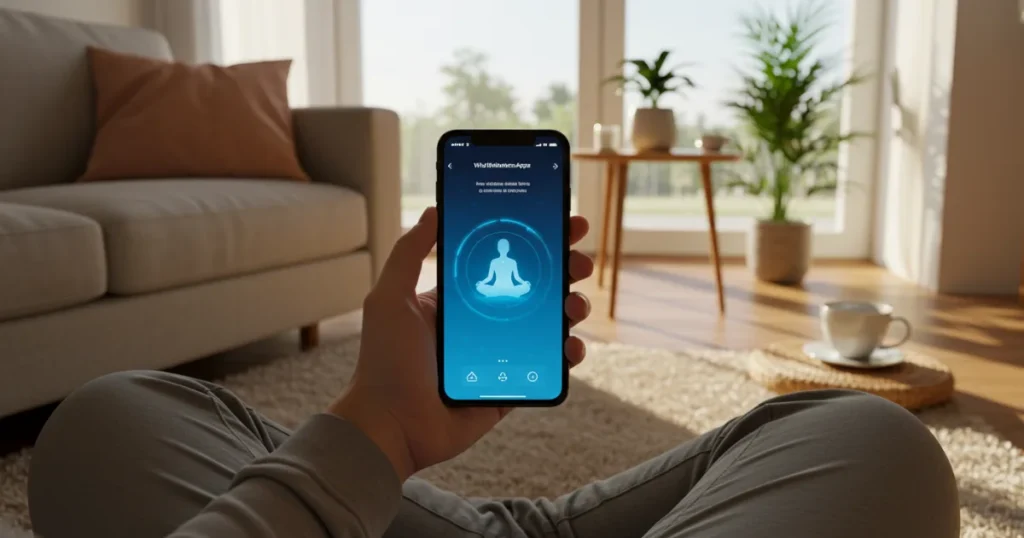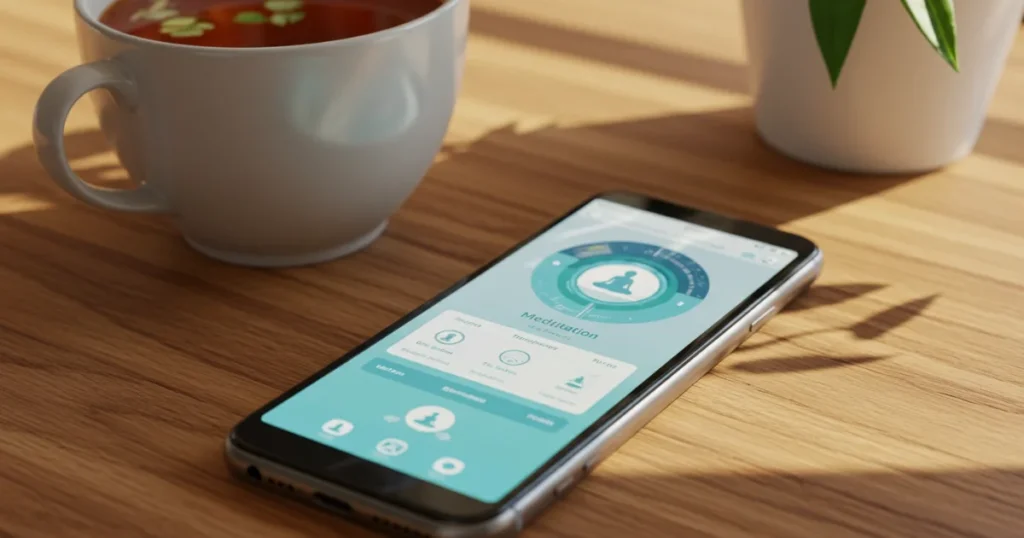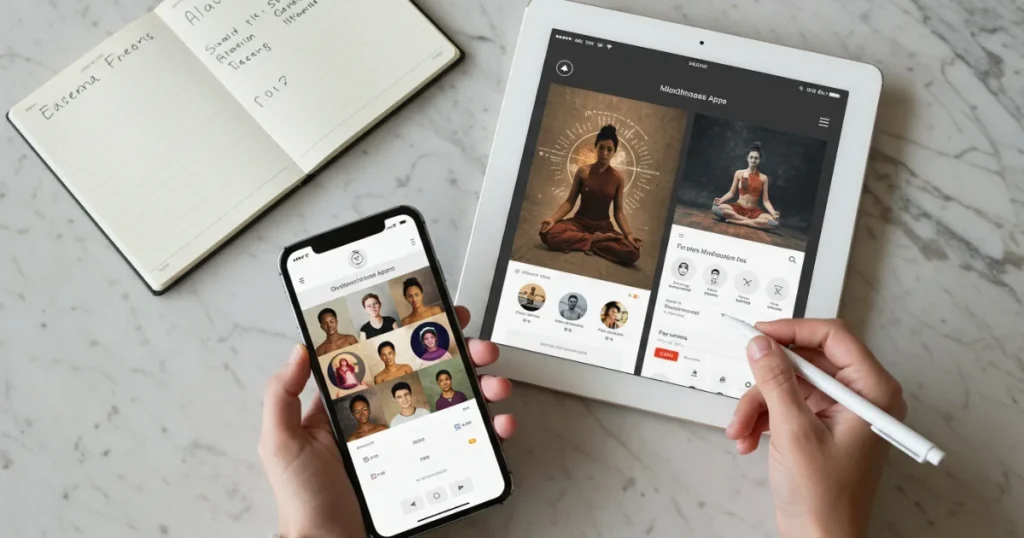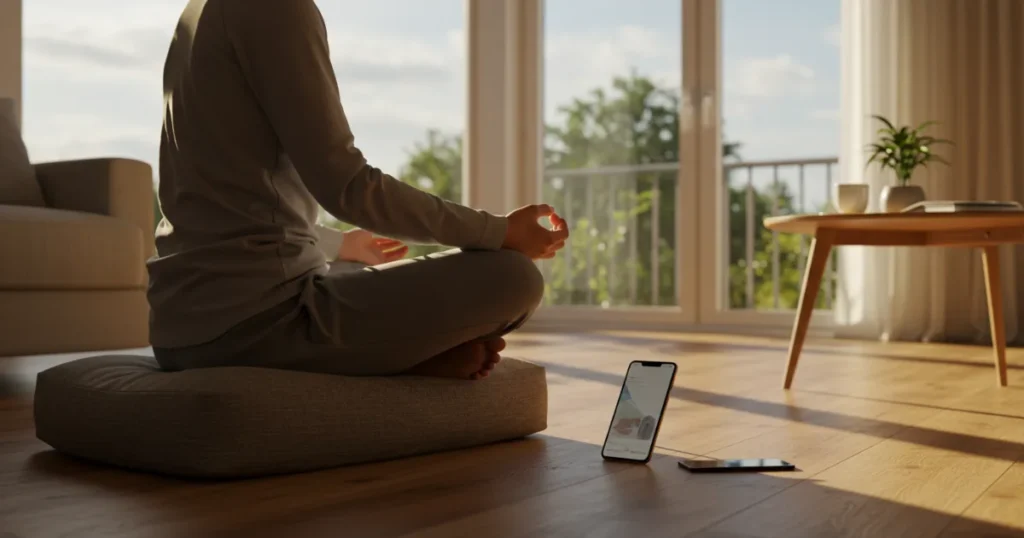
In our increasingly digital world, technology can either distract us from the present moment or help us engage with it more fully. Mindfulness apps represent a powerful way that technology can actually support mental well-being rather than diminish it.
With thousands of mindfulness and meditation apps available, finding the truly effective ones can feel overwhelming. Which apps offer genuine value? Which are worth the subscription fee? And which will collect digital dust after just a few uses?
In this guide, we’ll explore seven standout mindfulness apps in 2025 that offer evidence-based approaches, user-friendly interfaces, and features that support consistent practice. Whether you’re a complete beginner or looking to deepen an established mindfulness practice, there’s an app here that can meet you where you are.
What Makes a Great Mindfulness App?
Before diving into specific recommendations, let’s consider what differentiates truly helpful mindfulness apps from the rest:
Scientific Foundation: The best apps are built on evidence-based approaches to mindfulness and meditation, often developed with input from researchers and experienced practitioners.
Accessibility: Effective apps meet beginners where they are while offering progression paths toward deeper practice.
Engagement Design: Great apps incorporate behavioral psychology to encourage consistent practice without becoming addictive.
User Experience: Intuitive navigation, pleasant aesthetics, and minimal distractions create an environment conducive to mindfulness.
Personalization: The ability to tailor content to your specific needs, preferences, and schedule increases both relevance and consistent use.

With these criteria in mind, here are seven exceptional mindfulness apps worth exploring in 2025:
1. Insight Timer: Best Free Option with Vast Library
Key Features:
- Extensive library of over 160,000 free guided meditations, music tracks, and talks
- Community-focused approach with live events and groups
- Timer feature with customizable ambient sounds and interval bells
- Detailed progress tracking and meditation stats
- Optional premium subscription for courses and advanced features
Why It Stands Out: Insight Timer balances accessibility with depth, offering both entry-level content and advanced practices from world-renowned teachers. Its community features provide supportive accountability, and the free tier remains genuinely comprehensive—a rarity in today’s subscription-dominant landscape.
Best For: Practitioners of all levels who appreciate variety and want to explore different teaching styles without an immediate financial commitment.
Recent Updates: The 2025 version introduced AI-powered personalization that recommends content based on your preferences, mood, and previous sessions, making the vast library more navigable for newcomers.
2. Headspace: Best for Beginners and Structured Learning
Key Features:
- Well-structured courses that build systematically from basics to advanced practices
- Playful animations and accessible explanations of mindfulness concepts
- “SOS” sessions for moments of acute stress or anxiety
- Extensive sleep content including sleepcasts, soundscapes, and wind-down exercises
- Focus music and ambient soundscapes for work or study
Why It Stands Out: Headspace excels at making mindfulness approachable through clear instruction, charming visuals, and progressive learning paths. Its content is designed to build a strong foundation while keeping engagement high through variety and thoughtful UX design.
Best For: Newcomers to mindfulness who benefit from structure and clear guidance, as well as those who appreciate playful, engaging design.
Recent Updates: Headspace now incorporates adaptive learning technology that adjusts course difficulty and pacing based on your usage patterns and reported experiences, creating more personalized learning journeys.

3. Calm: Best for Sleep and Stress Reduction
Key Features:
- Sleep Stories narrated by celebrities and voice actors
- Daily Calm sessions for consistent, guided practice
- Breathwork exercises and body scans for stress reduction
- Masterclasses on topics like emotional intelligence and mindful eating
- Music tracks curated for relaxation, focus, and sleep
Why It Stands Out: Calm’s production quality is unmatched, with soothing visuals, professional audio, and content designed to address specific needs like sleep disturbances and anxiety. Its interface prioritizes simplicity, making it accessible even when you’re feeling overwhelmed.
Best For: Those struggling with sleep issues or seeking relief from stress and anxiety, particularly if they appreciate high-quality audio content and celebrity narrations.
Recent Updates: Calm’s newest feature includes personalized “Mindful Moments”—brief practices triggered by calendar events, location changes, or biometric readings from connected wearable devices, helping users navigate stressful transitions throughout their day.
4. Ten Percent Happier: Best for the Mindfulness-Curious Skeptic
Key Features:
- No-nonsense approach with minimal spiritual language
- Coaching feature connecting users with experienced meditation teachers
- Practical, science-based approaches to everyday challenges
- Thematic courses addressing specific issues like relationships and work stress
- Articulate explanations of how and why mindfulness practices work
Why It Stands Out: Ten Percent Happier speaks directly to those who might be put off by more esoteric or spiritual approaches to mindfulness. It presents practices in straightforward, pragmatic terms with an emphasis on scientific backing and real-world applications.
Best For: Analytical thinkers, skeptics, and those who prefer a more secular, evidence-based approach to mindfulness.
Recent Updates: The app now features “Mindfulness for…” series that applies meditation techniques to specific contexts like parenting, leadership, creativity, and athletic performance, making practices even more relevant to daily life.
5. Waking Up: Best for Deep Philosophical Exploration
Key Features:
- Intellectual approach integrating philosophy, neuroscience, and contemplative traditions
- Sequential course building foundational skills systematically
- Theory sections explaining the concepts behind practices
- Conversations with leading thinkers in mindfulness, consciousness, and related fields
- Guided and unguided meditation options with varying durations
Why It Stands Out: Waking Up goes beyond techniques to explore the nature of consciousness itself. It treats users as intelligent partners in exploration rather than just practitioners of techniques, creating a uniquely thought-provoking experience.
Best For: Those interested in the philosophical and scientific underpinnings of mindfulness, or experienced practitioners seeking to deepen their understanding.
Recent Updates: Waking Up now includes an innovative “Moments” feature that uses contextual awareness and brief prompts to integrate mindfulness into everyday activities, bridging formal practice with daily life.
6. Balance: Best Personalized Approach
Key Features:
- Personalized program that adapts to your experience level, goals, and feedback
- Daily questionnaires that refine your practice plan
- Progressive training that evolves as your skills develop
- Integration with health data to suggest practices based on sleep, activity, and stress levels
- Memory function that tracks your preferences and adjusts content accordingly
Why It Stands Out: While most apps offer some personalization, Balance makes it central to the experience. The app functions more like a personal meditation coach than a content library, creating a truly tailored path for each user.
Best For: Those who want guidance specific to their situation and appreciate an experience that evolves based on their progress and preferences.
Recent Updates: Balance recently introduced “Contextual Sessions” that consider your location, time of day, and recent activities to suggest the most relevant practices for your current situation.
7. MindEase: Best for Mental Health Support
Key Features:
- Programs designed specifically for anxiety, depression, and stress conditions
- Evidence-based approaches drawn from mindfulness-based cognitive therapy (MBCT)
- Mood tracking with visualization of patterns over time
- SOS tools for panic attacks and acute anxiety episodes
- Optional therapist integration feature for sharing progress with mental health providers
Why It Stands Out: MindEase bridges the gap between wellness apps and mental health interventions, providing research-backed approaches to managing specific conditions through mindfulness. Its clinical foundation offers reassurance for those seeking substantive support.
Best For: Individuals managing anxiety, depression, or stress-related conditions who want mindfulness approaches specifically designed for mental health challenges.
Recent Updates: The app now includes a groundbreaking “Mindful Messaging” feature that analyzes your digital communication patterns and suggests brief mindfulness interventions during high-stress digital interactions.

Comparing App Costs in 2025
| App | Free Version | Subscription Cost | Free Trial Period |
|---|---|---|---|
| Insight Timer | Extensive free content | $59.99/year | Free tier sufficient for many |
| Headspace | Limited | $69.99/year | 7 days |
| Calm | Limited | $69.99/year | 7 days |
| Ten Percent Happier | Very limited | $99.99/year | 7 days |
| Waking Up | First 5 lessons | $99.99/year | 7 days (free trial upon request) |
| Balance | First 10 days | $69.99/year | 10 days |
| MindEase | Assessment tools | $79.99/year | 14 days |
Note: Many apps offer discounted annual subscriptions for students, educators, and healthcare professionals. Prices may vary by region and payment method.
Note: Many apps offer discounted annual subscriptions for students, educators, and healthcare professionals. Prices may vary by region and payment method.
Integrating App Practice Into Daily Life
Having a mindfulness app on your phone doesn’t automatically translate to a consistent practice. Here are strategies for making the most of these digital tools:
Schedule Dedicated Times
Set specific times for formal practice using your app, treating these appointments with yourself as non-negotiable. Many users find success with:
- Morning sessions before checking email or social media
- Midday reset during lunch break
- Evening wind-down as part of a sleep routine
Enable Mindful Notifications
While most notifications pull us out of the present moment, mindfulness app reminders can serve the opposite function. Configure them thoughtfully:
- Schedule during natural transition periods in your day
- Use gentle, non-intrusive alert sounds
- Keep notification content motivational rather than guilt-inducing
Track Your Practice Without Judgment
Most apps offer statistics tracking features. Use these to observe patterns without harsh self-criticism:
- Notice which days and times you tend to practice most consistently
- Identify obstacles that repeatedly interfere with practice
- Celebrate streaks and milestones without becoming attached to them
Create Environmental Triggers
Associate specific physical locations or objects with your practice:
- Designate a particular chair or corner for your sessions
- Place a visual reminder (like a small stone or symbol) where you’ll see it daily
- Create a brief preparatory ritual (like making tea) that signals practice time
Beyond the Apps: The Limits of Digital Mindfulness
While mindfulness apps offer valuable support, it’s worth acknowledging their limitations:
- Screen time itself can interfere with presence and attention
- Digital mediation may reduce the benefits of direct instruction from experienced teachers
- Gamification elements can sometimes shift focus from practice to achievement
- Privacy concerns exist regarding sensitive psychological and behavioral data
Consider using apps as supplements to, rather than replacements for, other aspects of mindfulness practice:
- Attend occasional in-person retreats or workshops
- Explore mindfulness books that provide deeper context
- Practice technology-free mindfulness in natural settings
- Join local or online meditation communities for support
Conclusion: Finding Your Digital Mindfulness Partner
The best mindfulness app is ultimately the one you’ll use consistently. Consider downloading two or three that resonate with you based on this guide, exploring their free trials to determine which interface, teaching style, and content library best supports your practice.
Remember that these apps are tools, not destinations. The goal isn’t perfect adherence to an app program but rather developing a mindfulness practice that enhances your relationship with yourself and the world around you.
As technology continues to evolve, mindfulness apps will likely become even more sophisticated in their ability to support well-being. The seven highlighted here represent the current gold standard—platforms that use digital innovation to help us navigate our lives with greater awareness, kindness, and presence.
Which app will you try first? And how might consistent practice shape your relationship with technology and with the present moment?
Additional Resources
For those new to mindfulness apps:
- Start with the free tier of Insight Timer or the free trial of Headspace
- Begin with short (3-5 minute) sessions to build momentum
- Explore different teachers to find voices that resonate with you
For experienced practitioners:
- Consider Waking Up or Ten Percent Happier for more advanced content
- Experiment with unguided sessions using timer-only features
- Look for content addressing specific life challenges or deeper philosophical questions
For those using mindfulness for specific health concerns:
- Consult healthcare providers about how apps can complement treatment
- Consider MindEase or similar apps with clinical foundations
- Utilize tracking features to notice connections between practice and symptoms

Roberta Mendes is an award-winning journalist with 15+ years in digital storytelling. Passionate about wellness, sustainable living, and cultural exploration, she founded TheGreatLiving.net to inspire meaningful everyday experiences and build an engaged community.
